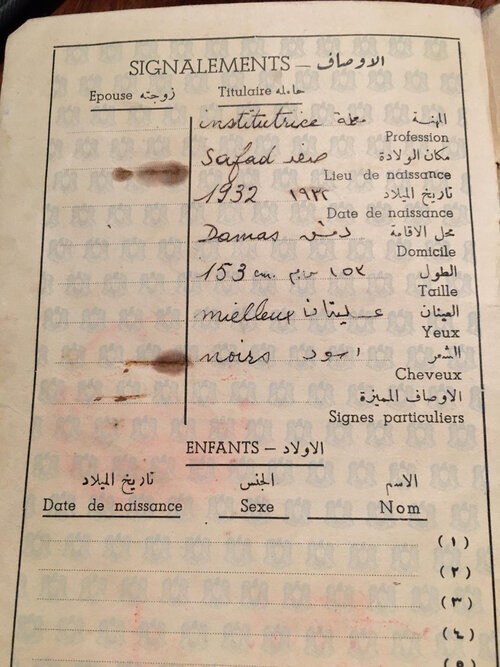Honoring Nouar Hijazi: Palestine refugee, educator, poet
“I lost the most iconic figure in my life, a long-time educator, an art enthusiast, a poet, the best cook,” says Omar Kurdi as he poignantly recalls his grandmother, who recently passed away. She was his hero, or as he says “the glue that held the family together.”
Omar lives in Ohio these days but his ethnic identity represents the diversity of the Middle East — Kurdish, Palestinian, Jordan, and Lebanese. He got his Palestinian roots from his grandmother, who became a refugee at the age of 15. Her name was Nouar Aref Hijazi and she was a remarkable woman whose life and legacy we aim to honor with this tribute with the help of her loving grandson.
Omar alongside his grandmother Nouar on a visit to Jordan
Nouar grew up in Safad, but like thousands of her fellow Palestine refugees, she was forcibly expelled in 1948.
At the tender age of 15, she was forced to make a new life and home in Damascus, Syria, along with her family. It was in Syria where she got her diploma in teaching in 1952, setting her off on a lifelong pursuit of knowledge.
“If she could spend her whole life in school teaching and learning, she would have,” says Omar. After receiving her diploma, her whole family moved to Irbid, Jordan, where Nouar got a job teaching Arabic at an UNRWA school from 1957 to 1996. In those 39 years, she positively touched thousands of refugees’ lives with her love, care, and devotion.
Documentation of Nouar’s refugee status
As a child, Omar attended private schools in Jordan, but he visited the UNRWA school where his grandmother taught a few times — experiences that have stayed with him long after the visits.
His visits showed another face to the plight of Palestine refugees — a positive one. While many aspects of refugeehood leave the displaced without agency, he feels that education empowers, allowing one to create their own narrative.
Omar shares that UNRWA not only gave refugee students a positive place to channel their energy and pursue their dreams, it was also a place that created a deeply rewarding experience for its educators:
“At the end of the day, UNRWA gave my grandmother a place of work, a living, generous pay, and a greater purpose through educating the next generation. She saw the struggles her students went through as a reflection of her own lived struggles, and she wanted better for her family and her students.”
Nouar was a full-time educator, and even outside the classroom, she never stopped teaching.
At home, Omar was frequently subjected to ‘pop quizzes,’ and while this felt tedious to him as a child, he now credits his strong grasp of Arabic and love for poetry to his grandmother's persistent lessons.
And it wasn’t just his grandmother who bestowed a love of learning upon him. “I was surrounded by educators my whole life,” he says. “My grandfather taught my grandmother’s brother. And that’s how they met. I’m literally [alive] because of the love for education.”
School, UNRWA, and love seem to go hand in hand in his household, as later, while his grandmother was teaching at the UNRWA school, she introduced her son, Omar’s uncle, to a fellow UNRWA teacher, and shortly after they got married.
Nouar, through the years
“One thing that bothered her, however, was that she could never return back,” says Omar, commenting on how though she loved living in Jordan, Palestine was her home, and like many other refugees, she longed to return. Despite this, she didn’t let her refugee status define her beyond giving her the motivation to help her fellow refugees uplift themselves.
Through her food, storytelling, and poetry, Nouar, though separated from her homeland, preserved her Palestinian heritage and passed it along to Omar and the rest of his family. “She told the best stories. I will miss hearing stories about Jerusalem, Damascus, Safad, Haifa, Yafa, and Akka. She cooked the best food. Her hands were blessed, I always enjoyed watching her cook. I loved to see her put her heart in the meals she fed us,” Omar shares wistfully.
Today, Omar keeps his grandmother’s memory alive through the very forms of art she introduced him to. He has written a scene that was inspired by her life and his visits with her in a play which was performed at the Arabic-speaking theater "Masrah Cleveland Al-Arabi" that he co-founded in Cleveland. He shared that being the grandchild of a refugee is a core part of his identity, and just like it gave his grandmother purpose, it does so for him as well.







